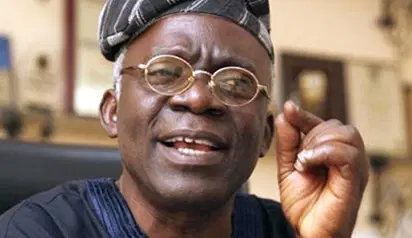News
Why Sale Of Port Harcourt Refinery To Dangote Was Cancelled By Yar’Adua– Falana

Prominent human rights lawyer and senior advocate, Femi Falana, has revealed why former President Umaru Yar’Adua cancelled the sale of the Port Harcourt refinery to a consortium led by Dangote Oil.
Falana described the reversal as a critical step to address the legal and ethical breaches surrounding the transaction and to protect Nigeria’s national interest.
In a detailed statement, Falana explained that under the Privatisation and Commercialisation Act, the Vice President is the chairman of the National Council on Privatisation (NCP), the body responsible for overseeing the privatisation of public enterprises.
However, he alleged that former President Olusegun Obasanjo bypassed this legal requirement by sidelining then-Vice President Atiku Abubakar and directly managing the privatisation of several state-owned enterprises.
“On May 17, 2007, President Obasanjo sold a 51% stake in the Port Harcourt refinery to Bluestar Oil for US$561 million. In another transaction that took place on May 28, 2007, President Obasanjo sold 51% shares in Kaduna Refinery to Bluestar Oil for $160 million,” Falana revealed.
Bluestar Oil, a consortium comprising Dangote Oil, Zenon Oil, and Transcorp, faced immediate scrutiny for the transactions. Critics pointed out potential conflicts of interest, as Obasanjo reportedly held significant shares in Transcorp through a “blind trust.” The sales, concluded just days before the end of Obasanjo’s administration, were widely viewed as rushed and lacking transparency.
Falana highlighted that the deals drew sharp criticism from key stakeholders, including the National Union of Petroleum and Natural Gas Workers (NUPENG) and the Petroleum and Natural Gas Senior Staff Association of Nigeria (PENGASSAN). The unions raised concerns over due process and alleged that the country had been shortchanged.
“They also alleged that the nation had been shortchanged as the shares acquired in the Port Harcourt refinery for $516 million were worth US$5 billion. Convinced that the deals were not in the national interest, both unions proceeded on a 4-day strike that almost paralysed the Nigerian economy in June 2007,” Falana noted.
The unions ended their strike after receiving assurances from the federal government that the deals would be thoroughly investigated. Following the probe, President Yar’Adua annulled the privatisation of both the Port Harcourt and Kaduna refineries.
“It is on record that the cancellation of the privatisation was not challenged in any court as it was carried out contrary to the letter and spirit of the Privatisation and Commercialisation Act,” Falana stated.
He further commended the role of NUPENG and PENGASSAN in advocating for national interest and called on them to remain vigilant amid renewed calls for the privatisation of Nigeria’s refineries.
“The Alliance on Surviving Covid and Beyond (ASCAB) hereby calls on NUPENG and PENGASSAN to intensify their historical struggle aimed at as a counterpoise to the renewed campaign for the privatisation of the nation’s refineries. Those who are awaiting the privatisation of the refineries in a manner at variance with the national interest should be advised to set up their own refineries like the Dangote Group,” Falana urged.
Falana’s statement underscores the ongoing debate over privatisation in Nigeria, with advocates like ASCAB emphasizing the need for transparency and adherence to due process in managing the country’s public assets.
:www.vanguardngr.com
-
Society News5 years ago
Jamaican man beheads wife after finding out their 6 kids are not his
-
Society News7 years ago
EXCLUSIVE: The Complete Story of Dolapo Awosika, John Fashanu and Prophet Kasali Sex Mess
-
News5 years ago
Pastor Osagie Ize-Iyamu, His Membership Of Secret Cult, And Other Issues Touching On His Public Credentials Examined by Barr. PATRICK I. BIOSE
-
News5 years ago
BREAKING: Ajimobi’s daughter-in-law blast Gov. Makinde, says gov can’t surpass ex-Oyo gov
-
Society News6 years ago
The Rise and Fall of “Jumoke The Bread Seller”
-
News5 years ago
BREAKING: 2 arrested as NAF begins investigations into Tolulope’s death
-
Crime6 years ago
Exclusive: Female Aide Fingered In Oko Oloyun’s Murder + Banking Transactions That Nailed Husband
-
News5 years ago
BREAKING: Police take over Edo House of Assembly as APC, Oshiomhole move to seize control
You must be logged in to post a comment Login